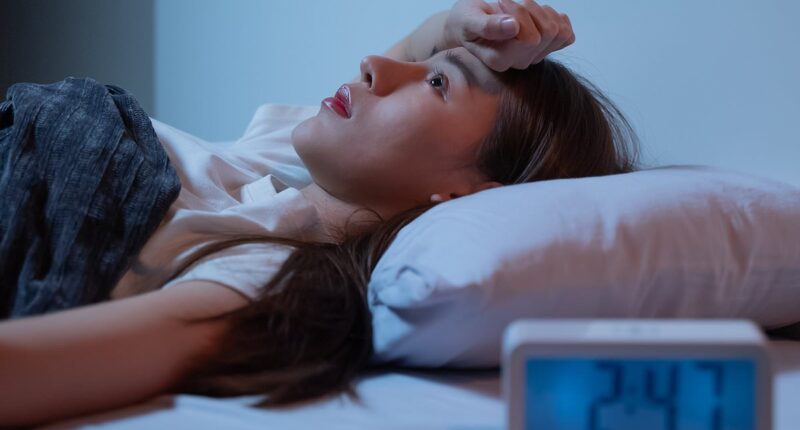If your menstrual cycle has been irregular or if you’ve been experiencing more severe symptoms than usual and have already ruled out factors like diet, sexual activity, and physical activity as potential causes, it may be beneficial to evaluate your sleep patterns.
‘Yes, sleep can affect your menstrual cycle,’ OBGYN and Medical Director for Nurx by Thirty Madison Dr. Navya Mysore told the DailyMail.com.
‘Your body’s internal clock, or circadian rhythm, helps regulate hormones like estrogen and progesterone that regulate your cycle.’
And when you’re consistently getting poor sleep or have irregular sleep patterns, you can disrupt this balance.
Dr. Mysore explained that a person’s menstrual cycle is extremely reliant on a delicate balance of hormones.
These hormones all respond to a wide range of factors from your everyday life.
Things like stress, diet, exercise, sleep, medical conditions, medications, and other lifestyle factors all contribute to your hormones.
And because these systems are so interconnected, even the slightest of a lifestyle shift can throw off your cycle’s rhythm.

OB/GYN Dr. Navya Mysore said that sleep is directly related to menstrual cycles (stock image)

Hormones that regulate your sleep cycle can also be affected, impacting other parts of your body (stock image)
And this includes your sleep schedule – especially if it’s not particularly healthy.
‘A lack of adequate sleep can result in disruptions to hormone levels, which can lead to irregular periods, changes in the intensity of menstrual bleeding, or even missed periods,’ explained Dr. Mysore.
This is because there are certain hormones that are regulated by your circadian and sleep cycle.
These hormones include melatonin, cortisol, thyroid stimulating hormone (TSH), prolactin, leptin, and insulin.
And leptin specifically, is important for regulating ovulation, menstruation, and your uterine lining.
When you don’t get enough sleep, your leptin levels drop, which can affect your entire menstrual cycle.
Furthermore, the issues in your menstrual cycle are not solely caused by the disrupted or insufficient sleep itself – the physical consequences of inadequate sleep also play a significant role in these disruptions.
‘Stress from sleep deprivation can elevate cortisol levels in the body, which further interferes with reproductive hormone regulation,’ Dr. Mysore said.

Studies have linked poor sleep cycles with more painful menstruation symptoms (stock image)
And while sleep could definitely be the reason your cycle has been irregular, you might still not be 100 percent sure it’s the culprit.
Dr. Mysore said the best way to determine if it is or not is to test it out.
‘If your period changes coincide with disrupted sleep – like shift work, jet lag, or insomnia – it’s a clue sleep may be a factor,’ she said.
‘Keeping a journal that tracks your sleep, stress, and cycle symptoms can help you spot patterns and rule out other causes.’
This might not just help make your period regular – it may also help ease some symptoms.
Studies have shown that people with poor sleep cycles experience more painful menstrual pain and symptoms.
So if you’re looking for a way to regulate your period and ensure your cramps aren’t too painful, you may want to start with getting a good night’s rest.

















